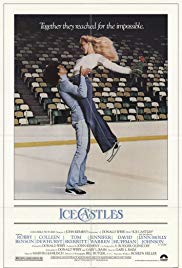
ICE CASTLES
US, 1978, 108 minutes, Colour.
Robby Benson, Lynn- Holly Johnson, Colleen Dewhurst, Tom Skerritt, Jennifer Warren, David Huffman.
Directed by Donald Wrye.
Ice Castles was very popular when first released in the 1970s. It focused on ice skating, very popular at the time.
Lynn- Holly Johnson had won a skating championship for novice level in 1974 and did her own skating in this film. She continued to act for almost twenty years after this film which was her first. Robby Benson, however, was very popular during the 1970s as a young lead in such films as One On One or The Ballad of Bobbie Jo.
The film’s plot stretches plausibility somewhat with Lynn-Holly? Johnson playing a skater who is blinded in an accident. However, she wants to continue skating and, despite her blindness, is successful.
The film has a strong adult supporting cast including Tom Skerritt as her father and Colleen Dewhurst. However, there was criticism at the time of the language of the film which seemed to preclude it from the younger audiences for which it was intended. (Later audiences may not notice this.)
The film appealed to teenagers, to a sense of achievement despite everything, with the touch of romance.
1. The appeal of this film? For what audience? The response of the younger audience, adults? The romanticism of the seventies? The perennial response to love stories?
2. The background of the American Midwest, colour and location photography, the atmosphere of winter and snow for the theme and story, the romantic score, the theme song and its use throughout the film? the lyrics and the theme?
3. The skill of ice skating, figure skating? Its appeal? The visual presentation of the sport, the use of music, dance, artistry and sport? The competitions?
4. The appeal of Lexi's story? audiences identifying with her, especially teenage girls? An attractive personality, strengths, weaknesses? Seeing her at home, her dead mother, relationship with her father and coping with his hardness? The training given by Beulah and the help with ambitions? The young friendship and blossoming of love with Nick? Her being a natural, development of her skills, her competitive attitude, her being laughed at, her winning, the importance of applause? Deborah and the hard training? Brian and the infatuation?
5. The importance of decisions for Lexi's life? the prospects in her home town, Beulah's training and local competition, Deborah's decisions and proposals, the effect on Lexi, on her father, on Nick? How did each of them help her in her decisions? The initial competitions and the effect on her, her joy, the opening up of possibilities? The possibility of disaster?
6. Deborah's world and deals, training, toughness, a way of life? The goal of the Olympics and their prestige? Lexi's wins and Deborah's helping her, the media and the interviews? The acclaim? The behind-the-scenes with tactics for publicity, the building up of an unknown into a star, the contrivance, the money deals, the use of the media? Brian and his style, his manipulation of the events, the interviews? Audience response to the making of a star?
7. The repercussions for Lexi? The growing away from Nick, the growing away from home? The romantic infatuation with Brian? The hard world of Deborah? the importance of the party? the challenge of the triple and her impulsiveness? The accident and the consequent blindness?
8. The importance of the blindness, her coping with it, her sick and retiring, her withdrawing to the attic? The emotional repercussions? home scenes? What made her finally pull through? her father's care for her? Nick and his help, presence, training? her admitting her faults, beginning again, the challenge and the training? The artistry of her performance, the irony of the roses revealing her blindness? The achievement and the emotive presentation, the kind of response asked from the audience? Sentiment, sentimentality?
9. How well written was the character of Lexi? An attractive girl, the unusual career, the confrontation of career and her strengths and weaknesses? her hurting people in her ambitions? her future?
10. Nick as hero? initial introduction to him, a pleasant young man, work, sporting skills, help, going away, being hurt at the performance, his return and building her up?
11. The portrait of the two coaches? Beulah and her memories of past achievement, helping the locals in their skill, a vision of what could happen to Lexi, vicarious success in the girl she trained? and the contrast of the world of professional toughness? Deborah and working only with winners?
12. The portrait of Lexi's father ? as a person, his memories, toughness, the reasons for his relenting, his support of his daughter?
13. Brian and the callow world of easy romance, professional success?
14. The fantasy aspects of the film and the realism for audiences of the seventies? Later?